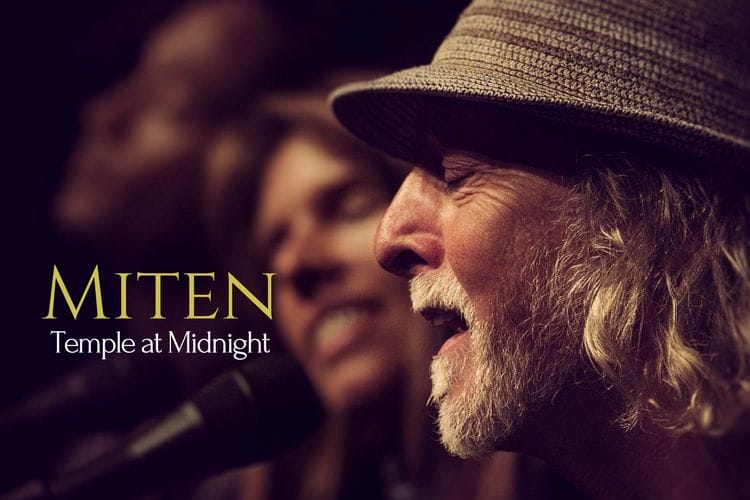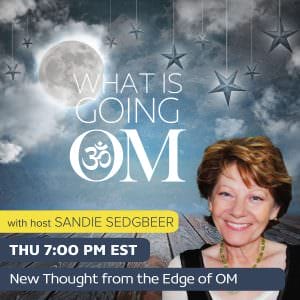Miten: Temple at Midnight

SANDRA SEDGBEER: Deva does not feature quite so much on this album as on others. Why is that?
MITEN: Joby Baker, our producer, had a vision for this album that did not include our normal way of making music. So, we wanted to use Deva in some Mantras, but for second voice and harmonies, and backing vocals in the traditional style of rock or folk music, we wanted a different sound. It just did not fit Deva’s voice to have her do that. It was more about using my voice, my guitar, and Joby’s voice and beautiful expression through his different instruments. What I like about this album is that there are no digital, pixelated sounds. It is all real instruments, and everything moves air. If you have a big, upright base, it moves air. The guitar moves air. The voice moves air. There are no synthesized sounds, so I think that helps the album to breathe.
SANDRA SEDGBEER: There is a song on Temple at Midnight called Guruji, which you describe as an acknowledgment to all your Gurus – the first one being John Lennon. How was John a Guru to you?
MITEN: Oh God! Oh God! I mean those four guys, what they gave me! They released so much energy and creativity in my little life back then as a 14-15-year-old boy growing up in England. Suddenly the sun came out with the Beatles, and they all had beautiful, interesting personalities, especially John. He was so funny. I can still remember moments with my friend back then, just holding our bellies with laughter reading John’s poetry book, A Spaniard in the Works, and things like that. So, John was a great Guru to me, and also because he went to India. He showed us all Maharishi, him and George Harrison, so he was definitely one of my early teachers, and I just wanted to honor him.
SANDRA SEDGBEER: Was it your reverence for John that inspired you to cover Norwegian Wood?
MITEN: Yes. I just love the song, and I felt it is a song that I can sing at my age. You can feel the older man looking back in time to that moment in the 60’s, in this room with this girl, and he was drinking wine hoping that they would go to bed together and that innocence and that awkwardness. John wrote it at the moment. It just happened to him. To me, looking back, I suddenly felt that was my story, too so I could approach Norwegian Wood with great reverence. I did it with great respect for John. I think it is a beautiful track, and I am very happy with it.
SANDRA SEDGBEER: In your song, The River, there is a phrase, “I carry you over to the other side.” That’s what music does. You could say that it’s also what a Guru does. Would you say that you have now become a Guru with your music?
MITEN: I do not feel in any way like a Guru. What I do feel is that I have become an elder in my generational family. I see that all my friends have their kids and the younger people who come to me and Deva that are singing Mantras, that are carrying the flame that we have been carrying. So in that way, I feel that I have the experience to offer.
As for my peers, my fellow ex-hippies and brothers and sisters around the planet, I feel we all have something to share. All of us have a life story, and that is why I see myself playing for my family, and it is an extended family that is all over the world, and it is a big family. Our world of meditation and yoga had become kind of semi-mainstream because there are so many of us from back then when we were in our 20’s and 30’s. Now we are in our 50’s and 60’s. So, many people come to see Deva and me in the concerts and come and sing with us. We have become like a congregation in our concerts, we all sing together, not emotionally-based songs, but Mantras, healing sounds from ancient times. Sometimes the music takes us into a deep stillness, and these are the people I play too. I do not feel like a Guru, I feel symbolical that when Deva and I step onto the stage, we are completing a circle, and then we can begin making music from that understanding. That we are all together, and we are all sharing our spaces of meditation and redemption and contemplation, with no stress at the moment, just being together and singing.
We are flame-carriers, really, Deva and I, from those 60’s times, and the thing that got Deva and me into a different place – and it did not happen for everyone – was that George Harrison took us all to India. He took us all to listen to Ravi Shankar, and it was revolutionary back then. We found meditation. Not everybody did. There were a lot of drugs, so you could easily lose your way.
SANDRA SEDGBEER: Deva says the main reason you and she sing is to bathe in the ecstatic silence that comes afterward. Now that is meditation, so people are meditating when they are listening to your concerts.
MITEN: Yes, absolutely. It doesn’t take people long to realize that our concerts are not what they thought they would be. We say to people: “Hey, you know you don’t have to clap because there is no-one to clap. We are in a circle so let us see what happens if we don’t clap at the end of every piece.” And when that clapping is not there something else emerges stillness, relaxation, that kind of breath where you feel: “Oh.” As you go on with that breath and the silence, that feeling deepens so by the end of the evening we are in a very joyful and open-hearted place, which is meditation.
SANDRA SEDGBEER: You have a track on this album called Humaniversal, about which you say you have your doubts as to whether humanity can save itself, but that human kindness is our only hope. Do you think that sacred music and Sanskrit healing Mantras can help heal our world?
MITEN: Yes, absolutely. I have seen it. I have evidence. When Deva and I started to sing these songs and Mantras in 1992, there were maybe 30 people in a little meditation room, and now we are playing to literally thousands. That is evidence. Those people were not there in 1990. We have watched the ripple go way out, we are playing Moscow and St. Petersburg in Russia and Warsaw in Poland and Rio de Janeiro. It is just incredible to see all these people and the joy that they bring and the energy. So I do see it can help. Whether it can save us, no, I do not have any big expectations on that way. I do not think anything can save us, that is pretty obvious, but it can definitely help.
SANDRA SEDGBEER: What is coming up for you and Deva next?
MITEN: Right now, we are in Australia for four months’ downtime, and we are writing a book. We are doing a benefit concert for Tibetan schools in Brisbane, a concert in Sydney, and a weekend ecstatic chant retreat here, then we go to Costa Rica in March for the Gayatri Festival at a beautiful resort called Blue Spirit in Costa Rica. Then we go back on the road. We start in Mexico and go through America up to Canada, and then in July and August we go to Corfu, Greece, then a tour of Europe and Russia, then back to Australia.
 You can listen to the full interview on What is Going Om with Sandie Sedgbeer on February 9th.
You can listen to the full interview on What is Going Om with Sandie Sedgbeer on February 9th.
To download a free song from Temple at Midnight visit http://store.devapremalmiten.com/river-man/
Temple at Midnight by Miten is available wherever good music is sold. For more information about Miten and Deva Premal’s music, retreats and schedule, visit www.devapremalmiten.com.
A veteran broadcaster, author, and media consultant, Sandie Sedgbeer brings her incisive interviewing style to a brand new series of radio programs, What Is Going OM on OMTimes Radio, showcasing the world’s leading thinkers, scientists, authors, educators and parenting experts whose ideas are at the cutting edge. A professional journalist who cut her teeth in the ultra-competitive world of British newspapers and magazines, Sandie has interviewed a wide range of personalities from authors, scientists, celebrities, spiritual teachers, and politicians.




